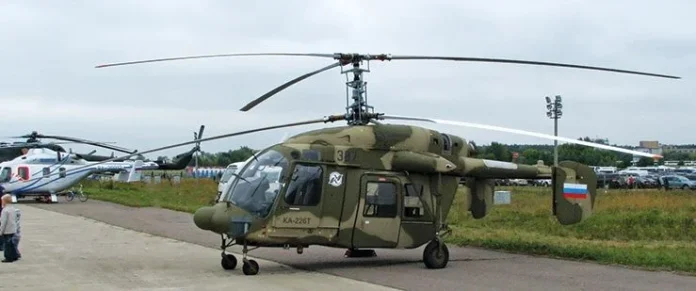Lucknow: The issues concerning the production localisation of Russian Ka-226T light utility helicopters (LUH) is in the process of being resolved, NM Srikanth, Chief Executive Officer (CEO) of the Indo-Russian Helicopters Limited (IRHL), said in Lucknow.
The final deal for manufacturing the helicopters in India has been held up for a while.
“The Defence Ministry has sought details regarding the localisation of the helicopter. We have submitted fresh details on that addressing the clarifications,” Srikanth said, adding the revised techo-commercial bid was now with the Ministry and may come up before the Defence Acquisition Council (DAC) at its next meeting.
The IRHL is a joint venture between Hindustan Aeronautics Limited (HAL) and Russian Helicopters (RH), which will assemble the Ka-226T helicopters in India.
Elaborating on the localisations plan, Srikanth said it would be spread over four phases. In Phase 1, 3.3 per cent indigenisation would be achieved for 35 helicopters, in Phase 2 it would go up to 15 per cent indigenisation for 25 helicopter, 35 per cent indigenisation for 30 helicopters in Phase 3 and eventually to 62.4 per cent indigenisation in Phase 4 for the last 50 helicopters.
The first helicopter would be delivered within 36 months from the signing of the contract and order completed in eight years, he stated.
The helicopter is powered by a French engine and would have 74 per cent Russian content and 26 per cent European content.
In 2015, India and Russia concluded an Inter-Governmental Agreement (IGA) for at least 200 Ka-226T helicopters estimated to cost over $1 billion. The Kamov-226T is meant to replace the ageing and obsolete Cheetah and Chetak fleets of the Indian Army and the Air Force.
As per procedure, the Defence Ministry has issued a Request For Proposal (RFP) to IRHL for 200 helicopters. The RFP earlier mentioned a localisation of 70 per cent, over which the final deal was held up as the JV could not meet that.
Of the 200, 60 helicopters will come directly from the RH plant in Ulan Ude and remaining will be assembled in India from supply kits from RH. This is where the issue of localisation is critical. “As 60 helicopters will be imported, the 70 per cent localisation should be met with the 140 to be assembled in India, which would make it almost 100 per cent localisation and not possible to meet,” one official said.
The roadmap signed at the Expo defines the main stages and terms for producing the Ka-226T helicopter in India and lays down the timelines for setting up production, contracting with suppliers, transferring design documentation, supplying technological equipment and machine kits, training Indian personnel and other key stages of the project to localise production, the RH said in a statement.
“The roadmap signed today will be the basis for further development of the Ka-226T localization project in India after the signing of the contract,” said Director General of Russian Helicopters holding company Andrei Boginsky.
To meet the localisation requirements as part of the deal, RH is entering into agreements with Indian companies for spares and components. While the Ka-226T is an India specific variant, the Ka-226 is flown by the Russian border security and coast guard which come under the Federal Security Service (FSB).





